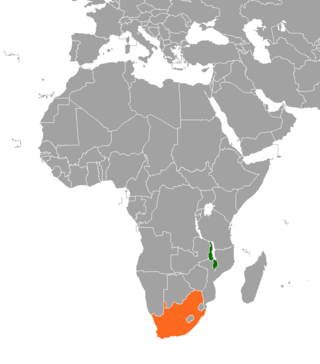The History of Malawi covers the area of present-day Malawi. The region was once part of the Maravi Empire. In colonial times, the territory was ruled by the British, under whose control it was known first as British Central Africa and later Nyasaland. It becomes part of the Federation of Rhodesia and Nyasaland. The country achieved full independence, as Malawi, in 1964. After independence, Malawi was ruled as a one-party state under Hastings Banda until 1994.

Hastings Kamuzu Banda was the leader of Malawi from 1964 to 1994. He served as Prime Minister from independence in 1964 to 1966, when Malawi was a Dominion / Commonwealth realm. In 1966, the country became a republic and he became the first president as a result, ruling until his defeat in 1994.

Brown James Mpinganjira, popularly known as BJ is a Malawian Politician who used his 1986 detention to fight the injustices of the then one party state. He worked with others in prison and used their time to devise ways on how to change the direction of Malawi's political state.

The Malawi Congress Party (MCP) is a political party in Malawi. It was formed as a successor party to the banned Nyasaland African Congress when the country, then known as Nyasaland, was under British rule. The MCP, under Hastings Banda, presided over Malawian independence in 1964, and from 1966 to 1993 was the only legal party in the country. It has continued to be a major force in the country since losing power.
Chakufwa Chihana was a Malawian human rights activist, pro-democracy advocate, trade unionist and later, politician. He held the post of Second Vice President in Malawi, under President Bakili Muluzi. He is often called the 'father of Malawian democracy'. He served as leader of Malawi's first underground political movement, which urged President Hastings Kamuzu Banda, who had ruled for three decades, to call for a referendum on political pluralism. He was awarded the Robert F. Kennedy Human Rights Award in 1992.

Frank Mkalawile Chipasula is a Malawian writer, editor and university professor, "easily one of the best of the known writers in the discourse of Malawian letters".
Jack Mapanje is a Malawian writer and poet. He was the head of English at the Chancellor College, the main campus of the University of Malawi before being imprisoned in 1987 for his collection Of Chameleons and Gods, which indirectly criticized the administration of President Hastings Banda. He was released in 1991 and emigrated to the UK, where he worked as a teacher.

Malawian-South African relations refers to the bilateral relationship between Malawi and South Africa. South Africa's first formal relationship with an independent African country was established with Malawi, beginning in 1967.

Wambali Mkandawire, popularly known as Mtebeti Wambali Mkandawire was a Malawian jazz singer and activist.

Cecilia Tamanda Kadzamira, GCVO was the official hostess of Malawi during the reign of president Hastings Banda. Whilst she and Banda were not officially married, she served as the first lady or official hostess for several years. For several years, she was the most powerful woman in Malawi. Kadzamira is referred to as "Mama" or "Mother of the Nation".
John Dustan Msonthi was a Malawian politician. He served as a Cabinet Minister and translator during the government of Kamuzu Banda.
Steve Bernard Miles Chimombo was a Malawian writer, poet, editor and teacher. He was born in Zomba.
Cosmo George Leipoldt Pieterse is a South African playwright, actor, poet, literary critic and anthologist.
John Lloyd Chipembere Lwanda is a Malawian medical doctor, writer, poet, researcher, publisher, and music producer. He is a published author and also a publisher of books and music. He was an honorary senior lecturer at the University of Glasgow Department of Primary Care until 2005. Lwanda did his history and social science PhD at the University of Edinburgh's Centre of African Studies.
Benedicto Wokomaatani Malunga, also known as Ben Malunga, is a Malawian poet, writing in the Chichewa language. He is also a short-story writer, an essayist, a music composer, public speaker, and translator who has translated Chinua Achebe's Things Fall Apart into Chichewa under the title Chipasupasu. Malunga holds a bachelor's degree from Chancellor College of the University of Malawi (1986) and an MA from Manchester University (1996) in the UK. He is currently working as Registrar for the University of Malawi and Secretary of the University of Malawi Council.

Professor Francis P. B. Moto is a Malawian writer, academic, and diplomat. His home is Golomoti in the Dedza District of Malawi. He attended secondary school in Chichiri in Blantyre and was admitted to the University of Malawi in 1972, obtaining a degree in linguistics in 1977.
Willie T. Zingani is a Malawian novelist, poet, playwright and journalist.








